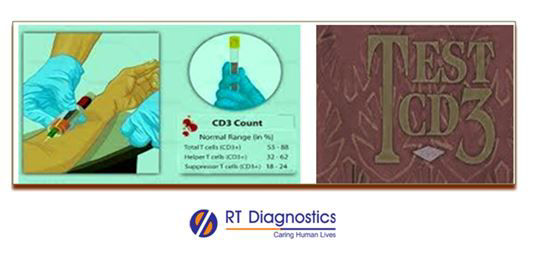CD3 TEST:
Why CD3 Test?
CLINICAL INFORMATION
Two types of lymphocytes namely T cells and B cells are synthesized in the bone marrow. B cells remain in the bone marrow for maturation while the T cells move to the thymus to mature, hence they are called T- Lymphocytes or T cells (thymus-derived lymphocyte) and B-lymphocytes or B cells (bone marrow-derived lymphocytes). T cells respond to viral infections and boost the immune function of other cells (T cells coordinate the activities of other cells in the immune system that fight viruses, bacteria, and cancers), while B cells fight bacterial infections. Abnormal T and B cells reflect altered immune function or disease like infection or disorders of the immune system. These lymphocyte subtypes are recognized by cell surface markers or antigens such as CD3, CD4, CD8 (CD means cluster of differentiation, a glycoprotein that serves as a co-receptor for the T-Cell Receptor -TCR The CD numbers identifies the specific subtype of immune cells), etc. T 4 or CD4 or Helper T cells coordinate the activity of other immune cells. CD 8 cells or Killer T-cells, recognize and destroy abnormal cells such as cancer cells and cells infected with a virus, and CD 8 or Suppressor T cells limit the activity of other immune cells so they do not harm normal tissues. The CD3 antigen is first detectable in early thymocytes and their appearances arise from the earliest signs of commitment to the T-cell lineage. It has a cytoplasmic expression at early T-cell differentiation, and then membranous expression. For T cell Antibody (auto-antibody) its specific antigenic epitope is CD3 marker antigen (self-antigen) in cases of auto-immune diseases (abnormal CD 8 or suppressor activity where self-antigen is recognized as foreign antigens and immune cells destroy the cells of the immune system). CD3 is expressed in normal thymocytes, peripheral T-cells, NK cells, and Purkinje cells of the cerebellum. CD3 test is performed on a blood sample to measure the level of CD3-lymphocytes in the blood (a type of WBC cells). Usually, this test is performed to confirm the T cell lymphoma or leukemia. Lymphoma is caused by very high T cell and B cell (WBC) in the body. The mature T cell (CD3) population consists of helper T cells (CD4) and suppressor T cells (CD8). Therefore absolute CD3 count or CD3 count (Mature T cells) is a lymphocyte test, where the sum total of CD4 (T helper cells) and CD8 (T suppressor cells) are calculated. This test is useful to evaluate the immune system of a person diagnosed with immunodeficiency (recurring infections like fungal infections eg. yeast, severe bacterial infections, trouble recovering from infections, infections that respond to treatments, recurring parasitic infections ), HIV infection enters the CD4 cells to reproduce, and kills those cells hence cause their numbers to reduce (a person with normal immune system has normal CD4 count, on the contrary low CD4 count reflects the progression of a disease such as HIV) or weakened immune system. Clinical signs and symptoms that may suggest the CD3 test are enlarged lymph nodes, itchiness or rashes on the skin, puffy skin, etc. CD3 stains most T-cell lymphomas and also in cases with B cell lymphoma CD3 test shows positive results.

General Instructions:
Sample Requirement: Specimen - Blood sample collected from the vein. Test Preparation: None.
NOTE - Sample for specimen collections may vary based on the patient’s condition/cases according to the patient’s presenting complaints/signs or symptoms:
SPECIMEN REQUIREMENT (Special or Rare Cases) - As instructed and guided by Physician / Clinician / Pathologist / as per Laboratory’s requirements, according to procedures and protocols.
Sample Requirement: Blood Sample
Test Preparation: Suggestions from your Doctor
This Multi-Specialty Clinical Referral Laboratory RT DIAGNOSTICS provides precise and accurate tests with an extensive range of testing services to the medical centers to help in the diagnosis and identification of pathology in the test specimens for infectious diseases and also to evaluate the function of organ systems of the patient. It prevents further complications and helps to stabilize and restore health to near normalcy at the earliest without delay.



